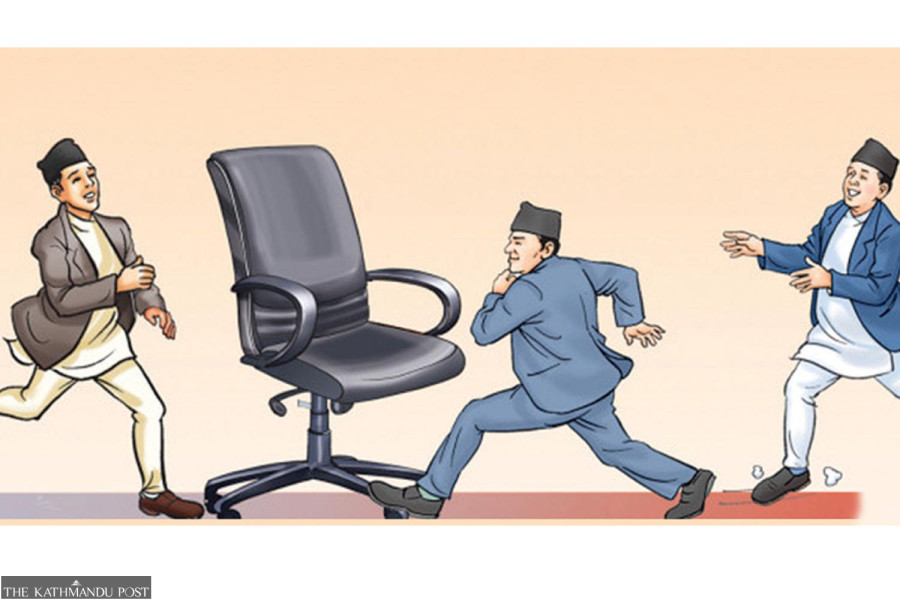Politics
The mad rush for power could destabilise politics
All big and small parties are negotiating to join government. Seemingly, no one wants to stay in the opposition.
Nishan Khatiwada
With no clear majority for either the Nepali Congress- or CPN-UML-led alliances in November polls, government formation is proving to be a tough row to hoe.
All major and fringe parties have been directly or indirectly negotiating to join the government. As such, government formation will get knottier, said political watchers.
The newly formed Rastriya Swatantra Party, which emerged as the fourth largest force from the recently-concluded polls, is yet to take a formal stand on government formation. But party chair Rabi Lamichhane has already hinted that the party is keeping its options open.
Speaking after getting the certificate of his election on November 25, Lamichhane said the party will proceed by forging necessary alliances. “Our party did not ally with anyone during the elections but we can still support a force working for the country’s betterment,” he said.
The party is mulling joining the government if it is led by new faces, say insiders.
Likewise, Mohan Shrestha, Rastriya Prajatantra Party Spokesperson, said the party has made no official decision on joining the government.
But, Shrestha told the Post, “if a situation arises whereby a government cannot be formed without RPP support, we can think about it.”
Similarly, Janata Samajbadi Party chair Upendra Yadav, speaking with journalists on Sunday in Biratnagar, said the utility of the electoral alliance it forged with UML before the major polls has ended.
“We supported them in some constituencies, and they in return supported us in some. That chapter has ended with the election’s completion,” he said. “Now we will discuss how to proceed afresh.”
Janamat Party and Nagarik Unmukti Party are also in touch with the key leaders of major political forces in a bid to join the next government.
On the other hand, the Congress-led alliance has decided to give continuity to the current alliance.
They arrived at the decision after the meeting of the ruling coalition in Baluwatar on Monday. “The results of the federal and provincial polls have again shown the necessity and relevance of the current alliance. It needs to be continued in order to tackle the challenges the country is facing,” read the press statement issued after the meeting.
But the Maoist Centre has been reportedly talking to all sides. Party chair Pushpa Kamal Dahal is regularly meeting the leaders of Nepali Congress, CPN (Unified Socialist) and CPN-UML. Prior to the ruling coalition meeting, he met UML secretary Raghuvir Mahaseth. After that, he called on Madhav Nepal at the latter’s residence.
The parliamentary majority of the Congress-led alliance is also uncertain.
As of this writing, Nepali Congress is likely to get 89 seats in total, Maoist Centre 32, Unified Socialist 10, Loktantrik Samajbadi Party four, and Rastriya Janamorcha one seat, for a total of 136—still two short of the magic number of 138. The jostling for government formation thus continues, with big and small parties staking their claims.
Political analyst Jhalak Subedi said election results suggest the UML should play the role of a strong opposition rather than get into the game of government-formation. “But the tendency here is that all the political parties are waiting for the right moment to get to power.”
The Rastriya Swatantra Party, too, could have vowed to play the role of a strong opposition, Subedi added, as their mandate too is not to join the government but to strongly raise public issues in the parliament.
Pitambar Bhandari, another political analyst, said the bargaining and horse-trading of political parties should be carefully watched. “The candidates have reportedly spent a lot of money on elections. Many may want to recoup that investment,” he told the Post.
According to Bhandari, the political parties have forgotten that a party can play important political and constitutional roles as an opposition, and yet they all want to get to power at any cost. “This is indicative of an immature political culture, which can only breed animosity among political parties,” he said.
Observers say the rush to get into government has been in evidence in Nepal since the 1990 political change.
After the collapse of a minority government in 1994, the trend of major parties looking to join the government at any cost started taking root. “After 2008, the Madhesh-based parties joined the trend.”
Such lust for power will not serve the national politics well, observers said.
“Although political parties are forming coalitions, there is always this fear that their partner could betray them. The mad rush to get into the government could even exacerbate intra-party feuds,” said Bhandari. “And if the political parties in a coalition start fearing each other, it will be difficult to keep such a coalition intact.”




 8.26°C Kathmandu
8.26°C Kathmandu















